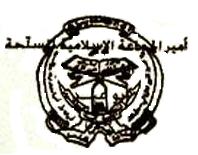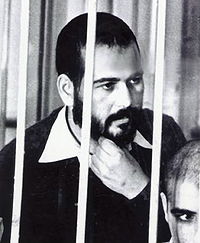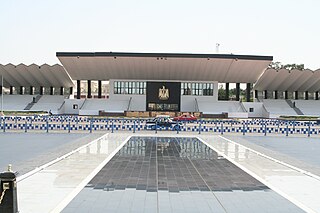
Muhammad Anwar el-Sadat was an Egyptian politician and military officer who served as the third president of Egypt, from 15 October 1970 until his assassination by fundamentalist army officers on 6 October 1981. Sadat was a senior member of the Free Officers who overthrew King Farouk in the Egyptian Revolution of 1952, and a close confidant of President Gamal Abdel Nasser, under whom he served as Vice President twice and whom he succeeded as president in 1970. In 1978, Sadat and Menachem Begin, Prime Minister of Israel, signed a peace treaty in cooperation with United States President Jimmy Carter, for which they were recognized with the Nobel Peace Prize.
The History of Algeria from 1962 to 1999 includes the period starting with preparations for independence and the aftermath of the independence war with France in the 1960s to the Civil War and the 1999 presidential election.

The Armed Islamic Group was one of the two main Islamist insurgent groups that fought the Algerian government and army in the Algerian Civil War.

Mohamed Boudiaf, also called Si Tayeb el Watani, was an Algerian political leader and one of the founders of the revolutionary National Liberation Front (FLN) that led the Algerian War of Independence (1954–1962). Boudiaf was exiled soon after Algerian independence, and did not go back to Algeria for 27 years. He returned in 1992 to accept a position of Chairman of the High Council of State, but was assassinated four months later.
According to most scholars the history of modern Egypt dates from the start of the rule of Muhammad Ali in 1805 and his launching of Egypt's modernization project that involved building a new army and suggesting a new map for the country, though the definition of Egypt's modern history has varied in accordance with different definitions of modernity. Some scholars date it as far back as 1516 with the Ottomans' defeat of the Mamlūks in 1516–17.

The Islamic Salvation Front was an Islamist political party in Algeria. The party had two major leaders representing its two bases of its support; Abbassi Madani appealed to pious small businessmen, and Ali Belhadj appealed to the angry, often unemployed youth of Algeria.

al-Jamāʻah al-islāmīyah, is an Egyptian Sunni Islamist movement, and is considered a terrorist organization by the United Kingdom and the European Union.al-Jamāʻah al-islāmīyah was removed from the list of Foreign Terrorist Organizations by the United States in May 2022. The group was dedicated to the overthrow of the Egyptian government and replacing it with an Islamic state; the group has committed to peaceful means following the coup that toppled Mohamed Morsi.

Mohamed Hassanein Heikal was an Egyptian journalist. For 17 years (1957–1974), he was editor-in-chief of the Cairo newspaper Al-Ahram and was a commentator on Arab affairs for more than 50 years.

The Algerian Civil War, known in Algeria as the Black Decade, was a civil war fought between the Algerian government and various Islamist rebel groups from 11 January 1992 to 8 February 2002. The war began slowly, as it initially appeared the government had successfully crushed the Islamist movement, but armed groups emerged to declare jihad and by 1994, violence had reached such a level that it appeared the government might not be able to withstand it. By 1996–97, it had become clear that the Islamist resistance had lost its popular support, although fighting continued for several years after.
The Algerian Civil War was an armed conflict in Algeria between the Algerian Government and multiple Islamist rebel groups, sparked by a military overthrow of the newly elected Islamist government. The war lasted from December 1991 until February 2002, though in the south of the country an Islamist insurgency remains ongoing.

Khalid al-Islambuli was an Egyptian military officer who participated in the assassination of Egyptian president Anwar Sadat, during the annual 6th October victory parade on 6 October 1981. Al-Islambuli stated that his primary motivation for the assassination was Sadat's signing of the Camp David Accords with Israel and Sadat's plan for a more progressive Egypt. Al-Islambuli was tried before an Egyptian court-martial, found guilty, and sentenced to death by firing squad. Following his execution, he was declared a martyr by many in the Islamic world, and became an inspirational symbol for Islamic movements as one of the first 'modern martyrs of Islam'.

Arab League–Iran relations refer to the political, economic, and cultural ties between the League of Arab States and the Islamic Republic of Iran. The former is a regional organization composed of 22 Arab states in MENA with a combined majority of Sunni Muslims, whereas the latter is a country in Western Asia with a majority of Shia Muslims.
Numerous civilians, including men, women, children, government officials, activists, secular intellectuals and clerics have been victims of assassination, terrorism, or violence against non-combatants, over the course of modern Iranian history. Among the most notable acts of terrorism in Iran in the 20th century have been the 1978 Cinema Rex fire and the 1990s chain murders of Iran.
Major General Smain Lamari was the head of an Algerian intelligence service, the Department of Counter-Espionage and Internal Security.
The Arab Cold War was a political rivalry in the Arab world from the early 1950s to the late 1970s, as part of the wider Cold War. It is generally accepted that the Egyptian revolution of 1952, which eventually led to Gamal Abdel Nasser becoming president of Egypt in 1956, marked the beginning of the Arab Cold War. Thereafter, newly formed Arab republics, defined by revolutionary secular nationalism and inspired by Nasser's Egypt, engaged in political rivalries with conservative traditionalist Arab monarchies, led by Saudi Arabia. The Iranian Revolution of 1979 is widely seen as the end of this period of internal conflict and rivalry. Ayatollah Ruhollah Khomeini was installed as the leader of Iran's theocratic government. A new era of Arab-Iranian tensions followed, overshadowing the bitterness of intra-Arab strife.

Anwar Sadat, the 3rd President of Egypt, was assassinated on 6 October 1981 during the annual victory parade held in Cairo to celebrate Operation Badr, during which the Egyptian Army had crossed the Suez Canal and taken back a small part of the Sinai Peninsula from Israel at the beginning of the Yom Kippur War. The assassination was undertaken by members of the Egyptian Islamic Jihad.

The history of Egypt under Anwar Sadat covers the eleven year period of Egyptian history from Anwar Sadat's election as President of Egypt on 15 October 1970, following the death of President Gamal Abdel Nasser, to Sadat's assassination by Islamist fundamentalist army officers on 6 October 1981. Though presenting himself as a Nasserist during his predecessor's lifetime, upon becoming President, Sadat broke with many of the core tenets of the domestic and foreign policy ideology that had defined Egyptian politics since the Egyptian Revolution of 1952. In addition to abandoning many of Nasser's economic and political principles via the Infitah policy, Sadat ended Egypt's strategic partnership with the Soviet Union in favor of a new strategic relationship with the United States, initiated the peace process with the State of Israel in exchange for the evacuation of all Israeli military forces and settlers from Egyptian territory, and instituted a form of politics in Egypt that, whilst far removed from Egypt's pre-revolution democratic system, allowed for some multi-party representation in Egyptian politics. Sadat's tenure also witnessed a rise in governmental corruption, and a widening of the gulf between rich and poor, both of which would become hallmarks of the presidency of his successor, Hosni Mubarak.
Hassan Abu Basha was a major general and one of the former ministers of interior of Egypt who was in office for two years from January 1982 to July 1984.

The 1992 Algerian coup d'état took place on 11 January 1992. Concerned by the FIS victory in the first round of the 1991 Algerian legislative election, the army took action and cancelled the electoral process to prevent the forming of an Islamic state in Algeria. The army forced president Chadli Bendjedid to resign and brought in the exiled Mohamed Boudiaf to serve as the new president. The military argued that they had done this to "safeguard Algeria's republican institutions from political and radical Islamists" and to prevent Algeria from turning into a theocratic state.
Events from the year 1992 in Algeria












